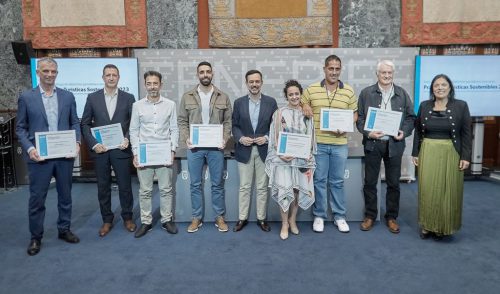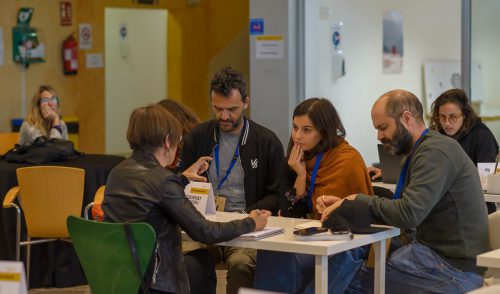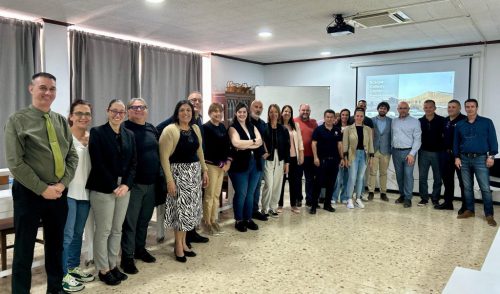Informe semanal de noticias del mercado alemán elaborado por la Oficina de Turismo de Tenerife en Fráncfort

- Market News:
Travel agency sales slightly increased in August: After the good bookings in July (plus 4.1 per cent), the stationary travel agencies were again able to increase the booked turnover of the previous year in August. According to Synccess statistics from back-office provider Ziel, bookings were 1.3 per cent higher than in August 2018. All in all, this means that the current tourism year is still marked by a minus in systems. It amounts to 1.3 per cent and can hardly be made up in September and October. However, the two-year comparison is interesting: with a view to the same booking period in the tourism year 2016/2017, travel agencies are currently up 3.6 per cent. Apart from this, booked turnover for commissions in the current tourism year plays only a partial role: most tour operators do not transfer their remuneration until shortly before or after the customer’s departure. And according to Synccess, the number of departures for the first ten months of the tourism year is up by 1.5 per cent.
Germany’s tourism industry is a global leader : In the ranking of a study by the World Economic Forum, Germany’s tourism industry achieved a top position: third out of 140 countries surveyed. The industry is booming worldwide – perhaps too strongly, the experts warn. According to an evaluation by the World Economic Forum (WEF), Germany’s travel and tourism industry is among the most competitive in the world. The study, which is published every two years, was presented during the WEF Africa Conference in Cape Town. Thanks to its good infrastructure and a strong cultural environment, Germany ranks third among the 140 countries surveyed in the WEF’s list published on Wednesday. However, the study also attests comparatively high prices to the German industry and rather low values in most regions in the area of safety and security.
– In Europe, Spain and France are ahead of Germany, Great Britain slipped to sixth place and Italy (8th), Switzerland (10th), Austria (11th) and Portugal (12th) are also among the top countries.
– Asia leads with Japan (4), Australia (7) and China (13), Hong Kong (14) and South Korea (16),
– America with the USA (5), Canada (9) and Mexico (19).
– North Africa and the Middle East only appear on the list with the United Arab Emirates (33), Qatar (51), Israel (57) and Oman (58).
– Sub-Saharan Africa is considered the laggard in tourism. With the exception of the three states Mauritius (rank 54), South Africa (61) and the Seychelles (62), the 36 countries surveyed there were all below the global average. However, the study predicts the second highest growth rates for Africa in the next ten years.
The industry as a whole contributed around ten percent to global value added and roughly the same share to global employment – a share that is likely to rise sharply in the coming decade, especially in Asia with its steadily growing middle class. In the previous year, global travel activity reached around 1.4 billion visitors, exceeding all forecasts. If the numbers continued to grow at this rate, the authors of the study consider an estimate of 1.8 billion visitors in 2030 to be rather conservative. In view of the pressure from the rapid growth in the top destinations, they warn against a reversal of the trend. So-called overtourism could represent a risk. In the South African tourist metropolis of Cape Town, the 28th WEF Africa Conference began on Wednesday with around 1100 participants.
- Tour Operator:
Thomas Cook Hotels plans more management contracts and in-house cross-selling: Thomas Cook wants to take tighter control of its hotels through more management contracts, sell more rooms to group tour operators and expand its portfolio cautiously, hotels chief Enric Noguer told fvw in an interview. Europe’s second-largest tourism group currently has 200 own-brand hotels with a total of 40,000 rooms trading under eight brands (Sentido, Casa Cook, Cook’s Club, Sunwings, Sunprime, Aldiana, Sunconect and Smartline). About 85% of these are franchises and only 15% are directly managed by the Group.But Noguer, an experienced hotel executive who took over as head of Thomas Cook Hotels & Resorts a year ago after previously working for Iberostar and TUI, wants to gain more control over the portfolio’s sales activities. «In future, we will focus more on the management operating model,» he said. He aims to double the current number of 30 managed hotels. Another priority is to sell more of the portfolio’s capacity within the Thomas Cook Group. About 70% of the 200 hotels are exclusively bookable through the group’s tour operators but these only account for about 50% of the 10 million room nights sold each year. The rest of the rooms are marketed through portals such as Booking.com and Expedia, the hotel brands’ own websites, Condor and other tour operators. In terms of the portfolio’s size, Noguer is backtracing from the target of former hotels chief Ingo Burmester who aimed to expand to about 300 own-brand hotels in the medium term. «We want to have 250 hotels in the portfolio by 2022.» This year, for example, Thomas Cook will add 20 hotels with more than 3,000 rooms but take 10 others with relatively low Net Promoter Scores out of the portfolio. «It doesn’t make sense to continue with a property with customer satisfaction of less than 30 (points),» Noguer said.
Tour operators hope for Sri Lanka recovery: German tour operators are hopeful about a recovery in demand for Sri Lanka over the coming months following the end of the state of emergency. Sri Lanka has officially ended the state of emergency four months after the devastating attacks at Easter that killed more than 250 people, including 40 foreigners, in three churches and three luxury hotels. The security situation on the island is now good again, according to a military spokesman.The tourism industry is hoping that this will signal the start of a comeback as international travellers gradually regain confidence in the destination. Visitor numbers to the island have plummeted since April, ending several years of spectacular growth. German tourist numbers for example increased by nearly 84% since 2013 to reach 157,000 last year. Total international visitor numbers topped 2.3 million in 2018. Tour operators in Germany quickly cancelled holidays and tours on Sri Lanka following the terror attacks, with many customers switching instead to destinations such as Thailand, Vietnam and the UAE. But now operators are back again with new offers to try to stimulate a recovery.»We can already see an initial recovery in demand and are optimistic that things will pick up again soon,» said Hannes Schleicher, from specialist Chamäleon Reisen. Similarly, Sabine Braun, Thomas Cook’s senior product manager for Asia and the Indian Ocean, commented: «We see a positive trend for the coming winter.»
- Aviation News:
More premium seats to the USA: From October 28th, United Airlines will be using a Boeing 777-200ER on its two daily flights from Frankfurt Airport to Washington Dulles International Airport. The aircraft has 50 business class seats and 24 seats in the new Premium Plus. A jet of the same type will also be in service on the daily route between Munich and the US capital from January 7th, 2020. United will thus be able to offer customers from Germany the complete range of cabins with Business, Premium Plus, Premium Economy and Economy Class on six of the 15 daily connections. By 2020, a United aircraft is to be equipped with the new premium cabins every ten days.









